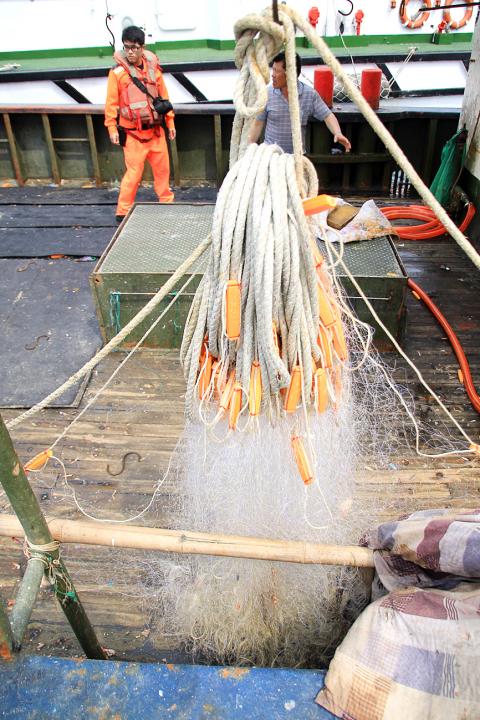Rapacious and indiscriminate fishing methods used by Chinese fishing vessels are not only damaging the marine ecology in Taiwanese territorial waters, but are also depriving Taiwanese fishermen of their source of livelihood, the Taiwan Coast Guard Administration (CGA) said.
While amendments passed in June last year increasing fines deterred Chinese fishing boats for a short time, with the number of Chinese fishing boats in the area dropping from 277 in 2014 to 79 last year, poachers have been acting in concert of late, the administration said.
Chinese ships were using bad weather to their advantage to fish illegally in Taiwanese waters, making it more difficult for the coast guard to board their ships, the CGA said, adding that a large number of vessels entered Taiwanese fishing grounds in August and used electrofishing, triple-layered gillnets, roller trawls and even poison to catch fish.

Photo: Wu Cheng-feng, Taipei Times
The administration said that in March it stopped a Chinese ship named Ching Ching Fishing 05055 south of the Pratas Islands (Dongsha Islands, 東沙群島) and found three green sea turtles, 15,000kg of coral, 400kg of giant clams and tadpole snails, as well as 40kg of toxic chemicals onboard.
Captain Huang Hsuan-kai (黃宣凱), head of the administration’s patrol force in Kinmen, said Chinese fishing boats scoured fishing grounds so thoroughly that they could in one night deprive other fishermen of a catch for three days.
Academia Sinica researcher Cheng Ming-hsiu (鄭明修) said fishing zones around the Pratas Islands and Penghu were the most severely damaged, as they were frequented by illegal fishermen from China and Vietnam.
In the past five years, the CGA has driven Chinese ships away from the two zones more than 700 times, Cheng said, adding that 90 percent of fishing resources in the region have vanished in the past 30 years.
Strong action must be taken to defend waters within 3 nautical miles (5.5km) of the coast, as such areas are typically the zones where fish and shrimp lay their eggs, Cheng said.
A recent spike in the number of crabs and shrimp in New Taipei City’s Wanli District (萬里) and Penghu shows that fish that eat young shrimp and crabs are disappearing, Cheng said, adding that if allowed to continue, the food chain would be disrupted.
Keelung Coastal Fishing Association director Lin Hsin-yung (林新永) said that Chinese ships often electrified their roller trawls, which causes great damage to marine life, as well as coral.
Lin said he had heard Chinese fishermen say that they were fishing in Taiwanese waters because their own coastal fishing supplies were running low due to the over-use of blast-fishing techniques.
Lin added that some Chinese ships try to get a cut from Taiwanese fishermen by trying to “muscle” their way into Taiwanese boats to get a share by force.

US President Donald Trump yesterday announced sweeping "reciprocal tariffs" on US trading partners, including a 32 percent tax on goods from Taiwan that is set to take effect on Wednesday. At a Rose Garden event, Trump declared a 10 percent baseline tax on imports from all countries, with the White House saying it would take effect on Saturday. Countries with larger trade surpluses with the US would face higher duties beginning on Wednesday, including Taiwan (32 percent), China (34 percent), Japan (24 percent), South Korea (25 percent), Vietnam (46 percent) and Thailand (36 percent). Canada and Mexico, the two largest US trading

AIR SUPPORT: The Ministry of National Defense thanked the US for the delivery, adding that it was an indicator of the White House’s commitment to the Taiwan Relations Act Deputy Minister of National Defense Po Horng-huei (柏鴻輝) and Representative to the US Alexander Yui on Friday attended a delivery ceremony for the first of Taiwan’s long-awaited 66 F-16C/D Block 70 jets at a Lockheed Martin Corp factory in Greenville, South Carolina. “We are so proud to be the global home of the F-16 and to support Taiwan’s air defense capabilities,” US Representative William Timmons wrote on X, alongside a photograph of Taiwanese and US officials at the event. The F-16C/D Block 70 jets Taiwan ordered have the same capabilities as aircraft that had been upgraded to F-16Vs. The batch of Lockheed Martin

GRIDLOCK: The National Fire Agency’s Special Search and Rescue team is on standby to travel to the countries to help out with the rescue effort A powerful earthquake rocked Myanmar and neighboring Thailand yesterday, killing at least three people in Bangkok and burying dozens when a high-rise building under construction collapsed. Footage shared on social media from Myanmar’s second-largest city showed widespread destruction, raising fears that many were trapped under the rubble or killed. The magnitude 7.7 earthquake, with an epicenter near Mandalay in Myanmar, struck at midday and was followed by a strong magnitude 6.4 aftershock. The extent of death, injury and destruction — especially in Myanmar, which is embroiled in a civil war and where information is tightly controlled at the best of times —

China's military today said it began joint army, navy and rocket force exercises around Taiwan to "serve as a stern warning and powerful deterrent against Taiwanese independence," calling President William Lai (賴清德) a "parasite." The exercises come after Lai called Beijing a "foreign hostile force" last month. More than 10 Chinese military ships approached close to Taiwan's 24 nautical mile (44.4km) contiguous zone this morning and Taiwan sent its own warships to respond, two senior Taiwanese officials said. Taiwan has not yet detected any live fire by the Chinese military so far, one of the officials said. The drills took place after US Secretary